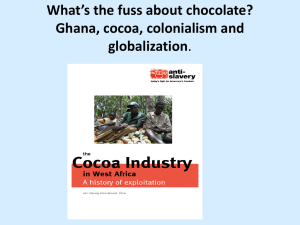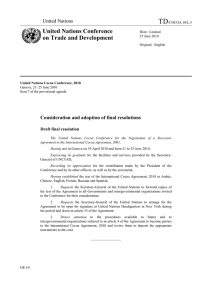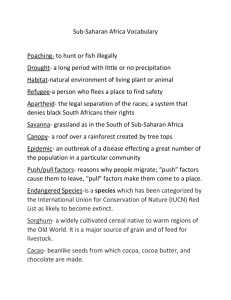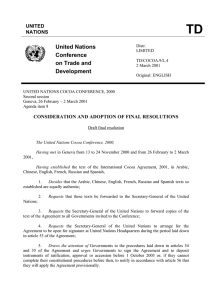UNCTAD
advertisement
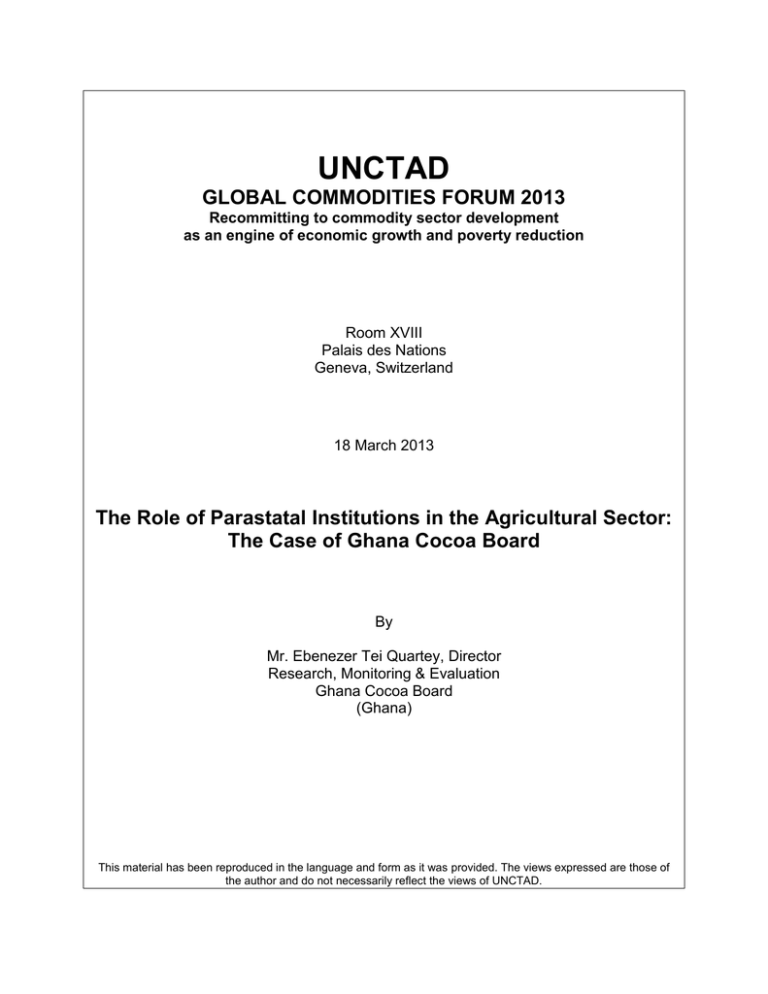
UNCTAD GLOBAL COMMODITIES FORUM 2013 Recommitting to commodity sector development as an engine of economic growth and poverty reduction Room XVIII Palais des Nations Geneva, Switzerland 18 March 2013 The Role of Parastatal Institutions in the Agricultural Sector: The Case of Ghana Cocoa Board By Mr. Ebenezer Tei Quartey, Director Research, Monitoring & Evaluation Ghana Cocoa Board (Ghana) This material has been reproduced in the language and form as it was provided. The views expressed are those of the author and do not necessarily reflect the views of UNCTAD. GLOBAL COMMODITIES FORUM 18‐ 19 MARCH 2013, GENEVA The Role of Parastatal Institutions in the Agricultural Sector: The Case of Ghana Cocoa Board by Mr. Ebenezer Tei Quartey Director‐ Research, Monitoring & Evaluation Ghana Cocoa Board Outline of Presentation • Brief background of the country and the importance of agriculture and cocoa to the economy • The role of the Ghana Cocoa Board (COCOBOD) in the development of Ghana’s cocoa sector • Challenges of the cocoa sector • Concluding remarks Background and importance of cocoa • Ghana is located in the West African sub‐region and is a member of Economic Community of West African States (ECOWAS) • The first cocoa farms were established in 1879 in Akwapim Mampong in the southeast of the country • Cocoa production supports the livelihood of more than 800,000 smallholder households in the forest agro‐ecological zones. Background and importance of cocoa Cont’d • Ghana’s economy has been built on agriculture and mining. Commercial production of oil began in 2010. • Cocoa exports generated over US$2.8 billion in revenues in 2012 The Role of the Ghana Cocoa Board • Ghana’s cocoa supply chain is unique because of its marketing arrangement • Private sector activities are combined with a strong government presence • The Ghana Cocoa Board and its Divisions regulate the activities of all other stakeholders in the industry • The cocoa marketing process begins with the farmer and ends with export by the government Role of COCOBOD cont’d • In the 1990s when marketing boards were being dismantled in response to World Bank prescriptions, government opted for gradual reforms • This resulted in partial liberalization of internal marketing with control over external marketing and quality control by COCOBOD • COCOBOD was set up in 1947 as the statutory public institution mandated to regulate the cocoa industry in Ghana. Role of COCOBOD cont’d The policies of COCOBOD are implemented through the following specialized Divisions: • Cocoa Research Institute of Ghana (CRIG) • Cocoa Swollen Shoot Virus Disease Control Unit (CSSVDCU) • Seed Production Unit (SPU) • Cocoa Diseases and Pest Control Programme (CODAPEC) popularly known as “Mass Spraying” • Quality Control Company Limited (QCC) • Cocoa Marketing Company Limited (CMC) Other Social Intervention activities • COCOBOD provides funding for the construction of health facilities in the farming communities provision of mosquito treated bednets, Provision of solar street lights Construction of solar boreholes to improve the living conditions in the farming communities the construction of rural roads to ease cocoa evacuation Management of the cocoa supply chain in Ghana • Strong role of the state in the management of the cocoa supply chain in Ghana • This is combined with a critical role for the private sector. • Smallholder farmers constitute the backbone of the cocoa supply chain cultivating cocoa on farms averaging two to three hectares. The Cocoa supply Chain‐Private Sector Actors • Important activities undertaken by the private sector include input supplies, cocoa purchases and transportation • However, COCOBOD retains an active role i. through its subsidized input distribution programmes targeting the cocoa farmer ii. by testing and approving, prior to importation and use on cocoa farms all inputs such as fertilizers, spraying machines and agro‐chemicals . The supply chain‐Private Sector Actors Cont’d • Cocoa Purchase Reforms in the 1990s ‐ privately owned Licensed Buying Companies (LBCs) allowed to buy cocoa on behalf of COCOBOD at the government determined floor price for a commission. • LBCs are registered by COCOBOD and must operate within rules and guidelines • Today there are 32 registered LBCs The supply chain‐Private Sector Actors Cont’d • Transportation ‐ Private transport service companies are responsible for delivering cocoa purchased from the districts to three “take over centres” namely Tema port, Takoradi port and the inland port of Kaase • Hauliers receive payments based on fixed rates determined by a Producer Price Review Committee (PPRC) Challenges of the sector • Despite the positive role that the state has played through COCOBOD, a number of challenges need to be addressed including the following: • provision of services (e.g., procurement and distribution of fertilizers) are best handled by the private sector as fertilizers do not reach farmers on time; Challenges of the sector Cont’d • COCOBOD is unable to execute these efficiently and creates opportunities for patronage and rent seeking behaviour. • Mass spraying of cocoa farms has become an avenue for the pilferage and sale of the subsidized inputs on the open market • Political interference is very common in the mass spraying programme because district political heads are in charge of the task forces Challenges of the sector Cont’d Fluctuating world cocoa prices Low technology adoption by farmers in production, harvesting and transportation of produce Reluctance of COCOBOD to embrace new technologies for marketing and sale of cocoa. This is manifested by the virtual absence of information on COCOBOD’s website Challenges of the sector Cont’d Ageing farmer population and lack of interest in cocoa farming by the youth Emergence of cocoa diseases and pests in almost all growing regions Poorly organized farmer associations because of dependency on COCOBOD Land tenure system that does not encourage farmers to make longer term investments in the farms Conclusion • The Ghana Cocoa Board has demonstrated the useful role that a parastatal institution can play in the development of the agricultural sector through the provision of public goods that the private sector is either unable or unwilling to provide. References • COCOA RESEARCH INSTITUTE OF GHANA. (VARIOUS ISSUES) CRIG Annual Reports. • Kolavalli, S. And Vigneri, M. Cocoa in Ghana: Shaping the Success of an Economy. Worldbank.org/AFRICAEXT/258643‐1271798012256/Ghana‐ cocoa.pdf • Laven, A. (2007) Marketing reforms in Ghana’s cocoa sector: partial reforms, partial benefits? ODI Background Note.http://www.odi.org.uk/resources/download/420.pdf • LMC International Limited (1996) The External Marketing of Ghana’s Cocoa. Prepared for the Ministry of Finance • MASDAR (1998) Socio‐Economic Study of the Cocoa Sector • MCINTIRE J. & P. VARANGIS (1998) Reforming Cocoa Marketing and Pricing in Cote d'Ivoire. World Bank, Washington • MINISTRY OF FINANCE (1999) Ghana Cocoa Sector Development Strategy References • SHEPHERD, A. W & S. FAROLFI (1999) Africa‐ A Review. FAO, Rome Export Crop Liberalization in • STRYKER, J. D. (1990) Trade, Exchange Rate and Agricultural Pricing Policies in Ghana. The World Bank, Washington • WORLD BANK (1984) Agricultural Services Rehabilitation Project • WORLD BANK (1987) Cocoa Rehabilitation Project • WORLD BANK (1992) Agricultural Sector Adjustment Programme • WORLD BANK (2011) Supply Chain Risk Assessment: Cocoa in Ghana • WORLD BANK (2012) Ghana Cocoa Policy Brief • Williams, T. (2009) An African Success Story: Ghana’s Cocoa Marketing System. IDS Working Paper 318 THANK YOU
